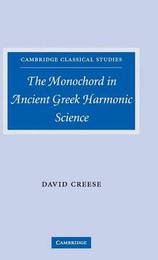
|
The Monochord in Ancient Greek Harmonic Science
Hardback
Main Details
| Title |
The Monochord in Ancient Greek Harmonic Science
|
| Authors and Contributors |
By (author) David Creese
|
| Series | Cambridge Classical Studies |
|---|
| Physical Properties |
| Format:Hardback | | Pages:426 | | Dimensions(mm): Height 224,Width 145 |
|
| Category/Genre | Theory of music and musicology |
|---|
| ISBN/Barcode |
9780521843249
|
| Classifications | Dewey:781.232 |
|---|
| Audience | | Postgraduate, Research & Scholarly | |
|---|
| Illustrations |
5 Tables, unspecified; 26 Line drawings, unspecified
|
|
Publishing Details |
| Publisher |
Cambridge University Press
|
| Imprint |
Cambridge University Press
|
| Publication Date |
10 June 2010 |
| Publication Country |
United Kingdom
|
Description
Among the many instruments devised by students of mathematical sciences in ancient Greece, the monochord provides one of the best opportunities to examine the methodologies of those who employed it in their investigations. Consisting of a single string which could be divided at measured points by means of movable bridges, it was used to demonstrate theorems about the arithmetical relationships between pitched sounds in music. This book traces the history of the monochord and its multiple uses down to Ptolemy, bringing together all the relevant evidence in one comprehensive study. By comparing the monochord with a number of other ancient scientific instruments and their uses, David Creese shows how the investigation of music in ancient Greece not only shares in the patterns of demonstrative and argumentative instrument use common to other sciences, but also goes beyond them in offering the possibility of a rigorous empiricism unparalleled in Greek science.
Author Biography
David Creese is Assistant Professor of Greek and Latin Literature at the University of British Columbia.
Reviews"The results achieved by this book go well beyond those suggested by the title... . Despite the complexity of the topic, the text is well written. It makes an important contribution not only to current scholarship on Greek musical theory...but also to the study of ancient Greek science in general." --BMCR All this is not to detract from the fact that David Creese has filled an important gap in the studies of ancient Greek music in a masterful way, in a book that enriches the libraries of everybody interested in this particular field of study, philologist or music historian, as well as in the development of scientific though in general." -- Stefan Hagel, Institute for Research in Classical Philosophy and Science
|